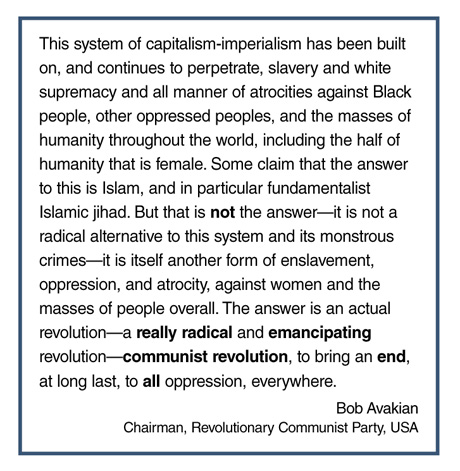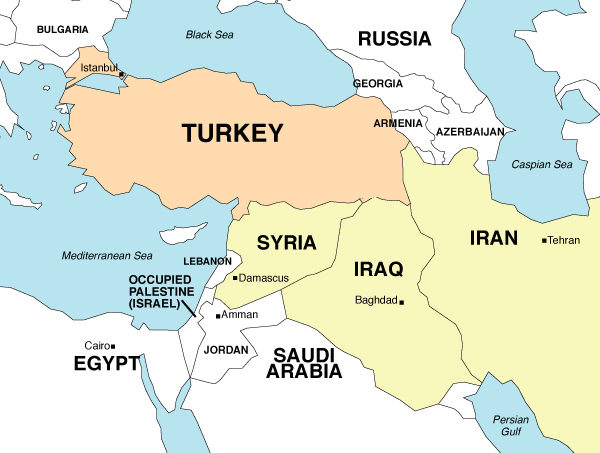Attempted Coup in Turkey & the Potential for Real Revolution
August 8, 2016 | Revolution Newspaper | revcom.us
Turkey, a large country and key U.S. partner, is considered an anchor of stability in the tumultuous, imperialist-dominated Middle East. But on the night of July 15, contradictions roiling beneath the surface of Turkish society suddenly exploded into the open.

Units of the Turkish military attempted an armed coup to depose the Islamist government of President Recep Tayyip Erdoğan (pronounced ERD-owan). The coup-makers arrested some top pro- Erdoğan military officials, bombed parliament, took over the state television channel, and tried to capture Erdoğan, the leader of the governing Islamist AKP (Justice and Development Party). Suddenly, it was not clear who held the reins of power.
But the coup-makers barely missed capturing Erdoğan. They weren’t able to gain enough support from the Turkish military and ruling class. And they didn’t rally masses of people to their side.
Erdoğan reacted quickly, mobilizing his supporters, even at the risk of civil war. A key move: he used a smartphone to connect with CNN-Turkey and broadcast a call to his followers, including people from the country’s 85,000 mosques, to go to the streets and fight against the coup. By the afternoon of July 16, it was clear that Erdoğan and his allies had crushed the coup and retained power.
Even so, this sudden fragmentation of Turkey’s political order sent shock waves around the region and world. It highlighted the depth of the global, regional, and domestic conflicts destabilizing Turkey, in the overall context of the global conflict between Western imperialism and fundamentalist Islamic Jihad. Most important, it underscored the urgent need and real potential for breaking out of the horrific dynamic framed by these two reactionary social forces, and bringing forward a genuine revolutionary pole, based on Bob Avakian’s new synthesis of communism.
Background: Imperialism & the Rise of Islamic Rule in Turkey
Turkey is located at the junction between Europe, Asia, and the Middle East, and is one of the region’s more powerful and most strategically located countries. Historically, Turkey has been economically and strategically subordinated to global imperialism. (Turkey is a member of NATO.) It’s also a brutally oppressive state forged through the horrific genocide of more than a million Armenians, and the violent subjugation of the country’s 10-15 million Kurdish people. (Over the past 30 years, the Turkish government has killed some 40,000 Kurds, trying to crush their struggle for self-determination.)
Bob Avakian on the Rise of Islamic Fundamentalism: Excerpts from Away With All Gods!
Religious Fundamentalism, Imperialism and "The War on Terror"
Read moreWhy Is Religious Fundamentalism Growing in Today's World
Read more
Until recently, Turkey’s oppressing classes have ruled through a secular state, one whose laws are not based on religion. But Turkey, like the rest of the world, has been transformed and destabilized by the enormous economic, social, and political changes being driven by the workings of global imperialism. These and other global changes, as Bob Avakian has analyzed, have also given rise to the resurgence of religious fundamentalism, and in the Middle East to Islamic fundamentalism and jihadism.
This led in 2002-2003 to the coming to power of Erdoğan and his reactionary Islamist AKP, which marked a major shift in Turkish politics. Since taking power, Erdoğan has moved to solidify his grip on Turkey’s political institutions and military. He’s also sought to break down secular rule and push for the Islamization of Turkey’s state and society, with all the horrors this entails, including even more horrendous subjugation and degradation of women. In this, Erdoğan was joined by other Islamist forces, but these allies became bitter rivals. (Erdoğan is accusing the Islamist Fethullah Gȕlen and his followers of organizing the recent coup attempt.)
This falling out and coup attempt did not reflect a theological dispute between different Islamists. Rather, it was a product of the overarching contradiction between imperialism and Islamic fundamentalism and the underlying dynamics of imperialist development. These contradictions have fractured the Turkish political system and propelled different forces into conflict with each other over how to deal with the situation, internally and externally.
Erdoğan’s Vicious Crackdown
The coup attempt shocked the Erdoğan government. The fissures in the state it revealed left Erdoğan with little alternative but “forward flight,” speeding up his efforts to consolidate his hold on power, and cleaning out the military, security forces, intelligence services, judiciary, and other government structures, as well as the secondary school and university systems of all opposition to his agenda.
At this writing, Erdoğan has instituted a state of emergency and called for the return of the death penalty. Nearly 16,000 people have been detained—10,000 of them military personnel; over 8,000 have been arrested, including a third of the general-rank military command and 1,684 prosecutors and judges; 130 publications have been shut down, and over 60,000 employees, mainly from the Ministry of Education, have been fired or suspended, including the deans of all of Turkey’s 1,500-plus universities. Turkish lawyers report detainees face torture, beatings, and rape.
The revengist Turkish chauvinism laced with Islamic fanaticism that Erdoğan is unleashing in the wake of the coup attempt goes hand-in-hand with an all-out campaign to wipe out resistance in Turkey’s Kurdish provinces and the targeting of the recently established U.S.-backed autonomous Kurdish region in northern Syria (Rojava) and the PKK presence in Iraq.
For all this, Erdoğan’s triumph and vicious counter-attack will likely make the ideological and political structure of the Turkish state more brittle.
The U.S.: Better Erdoğan Than the Unraveling of Turkey
When news of the coup attempt emerged, emergency meetings of foreign ministers were convened in countries from Moscow to Washington and at the European Union and NATO level, as all the major players anxiously scrambled to get a handle on this sudden eruption of political uncertainty and turmoil.

Turkey, with the second-largest army in NATO, has long been a linchpin of Western imperialist control of the Middle East and a key U.S. ally. But in the last several years, there have been serious tensions between the U.S. and Turkey over actions by Erdoğan the U.S. rulers feel run counter to their overall regional dominance, including his Islamism and conflicts over anti-ISIS strategy, for example in relation to the Syrian civil war.
Nonetheless, the U.S. and other Western powers backed Erdoğan when news of the coup broke. The Obama administration declared its “absolute support for Turkey’s democratically elected, civilian government and democratic institutions.” Whatever their differences with Erdoğan, they feared the instability of a coup more. The New York Times editorialized, “The volatile Middle East cannot afford to have another state unravel, especially one that is also a bulwark of NATO’s eastern flank.”
Even so, serious differences between the U.S. and the Erdoğan regime remain, and are likely to be intensified by the failed coup.
U.S. support for the reactionary Islamist butcher Erdoğan speaks volumes about who its vaunted allies are, and what the U.S. spreads around the world: imperialism and political structures that enforce imperialism. After the coup, the U.S. has said Erdoğan should be restrained and follow due process, but any protests the Obama administration has made on behalf of the thousands brutally fired, detained, tortured or killed are barely audible.
Key to Breaking Out of the Deadlock Between Imperialism and Islamism:
Grasping Bob Avakian’s New Synthesis of Communism
The attempted coup in Turkey reveals the intensity of the contradictions boiling in Turkey and the potential for further jolts and crises. Yet among many Turkish people and others who care deeply about the future of the Middle East, there’s been a current of paralyzing disorientation and despair.
Ishak Baran (“Turkey: Contradictions Reach a Boiling Point”) writes that a key cause of this demoralization is
[T]he prevailing lack of a correct understanding of the possibility of breaking out of the deadlock between imperialism and Islamism and all the horrors this situation is creating—that the same contradictions driving this process also provide the material basis to do so through revolutionary change....
To see the reality beneath appearances—how the underlying contradictions driving the ugly and destructive developments in the region and now in Turkey also provide the material basis for a thorough-going revolution—requires the science of communism. Today this means grasping Avakian’s breakthrough in developing a more scientific approach and method to understanding the world and changing it....
Anyone and everyone who can’t stand the situation in the Middle East and the world has to urgently familiarize themselves with and grapple with this new synthesis of communism. Cores of people must emerge—and quickly—in Turkey and elsewhere, people who struggle to master and wield the new synthesis of communism and commit themselves to forging a vanguard force to take up the tasks of producing a movement for revolution and a revolutionary people, as this goal and understanding brings an increasing number of people into action.
This is how we can bring out, act upon and seize the revolutionary possibilities latent within the situation that is crushing the people today.
(This article draws from Ishak Baran’s “Turkey: Contradictions Reach a Boiling Point” published on July 21, 2016 by A World to Win News Service, and posted on revcom.us. Ishak Baran is a supporter of Bob Avakian’s new synthesis of communism and a veteran participant of the Maoist movement in Turkey.)
Volunteers Needed... for revcom.us and Revolution
If you like this article, subscribe, donate to and sustain Revolution newspaper.

 What we see in contention here with Jihad on the one hand and McWorld/McCrusade [increasingly globalized western imperialism] on the other hand, are historically outmoded strata among colonized and oppressed humanity up against historically outmoded ruling strata of the imperialist system. These two reactionary poles reinforce each other, even while opposing each other. If you side with either of these "outmodeds," you end up strengthening both.
What we see in contention here with Jihad on the one hand and McWorld/McCrusade [increasingly globalized western imperialism] on the other hand, are historically outmoded strata among colonized and oppressed humanity up against historically outmoded ruling strata of the imperialist system. These two reactionary poles reinforce each other, even while opposing each other. If you side with either of these "outmodeds," you end up strengthening both.





